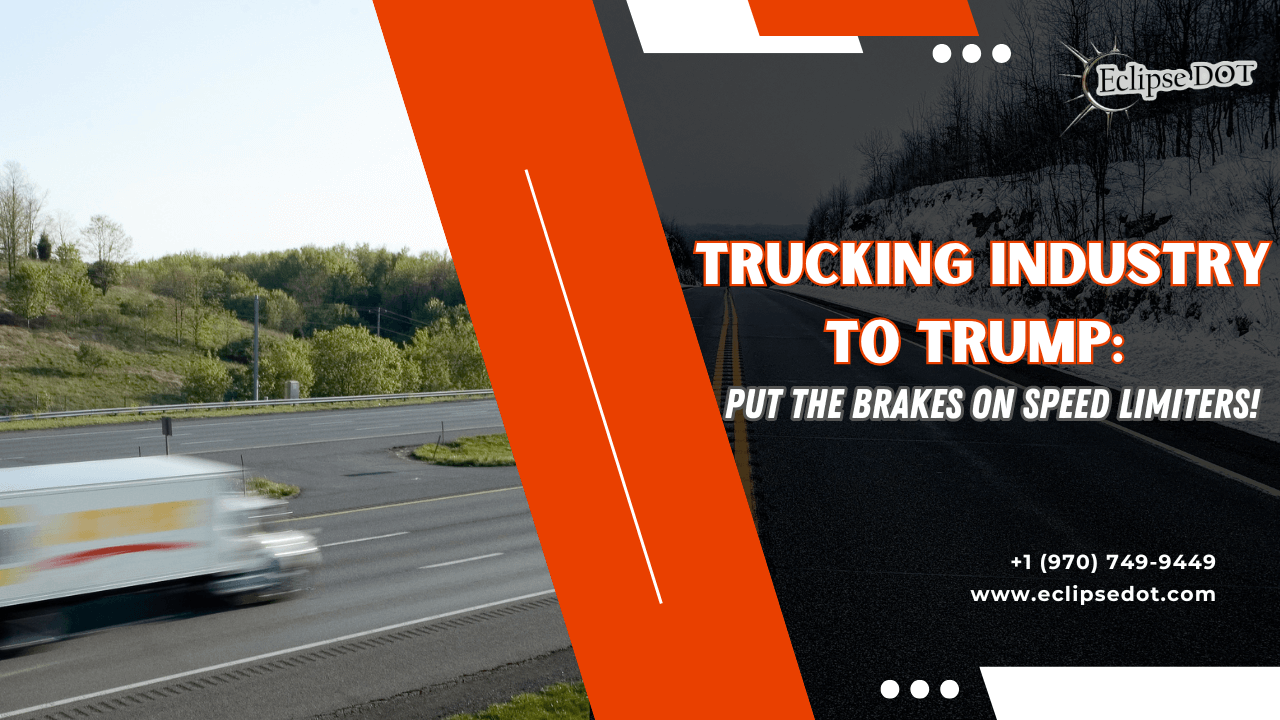The trucking industry is rallying together and sending a clear message to President-elect Donald Trump: speed limiters are a roadblock we don’t need. In a spirited letter to Trump’s Mar-a-Lago mailbox, a coalition of 17 organizations is urging him to scrap the Federal Motor Carrier Safety Administration’s (FMCSA) proposed speed limiter mandate. Why? Because it’s not just about slowing trucks; it’s about slowing down the entire country.
This proposed rule, originally put in the works in 2016, would require all heavy-duty trucks weighing more than 26,000 pounds to cap their speed using electronic engine control units (ECUs). Supporters think it’ll make the roads safer, but critics—truckers and industry experts alike—are saying, “Not so fast.”
The coalition, featuring organizations like the Owner-Operators Independent Drivers Association (OOIDA) and the North American Punjabi Trucking Association, is sounding the alarm: this mandate could backfire spectacularly, jeopardizing road safety, supply chain efficiency, and driver satisfaction.
The Speed Limiter Mandate: More Harm Than Help?
On paper, the speed limiter rule might seem like a win for highway safety—less speed means fewer crashes, right? But as anyone who’s spent time behind the wheel of a truck (or even a sedan) knows, the reality isn’t so simple.
Truckers argue that forcing heavy-duty vehicles to crawl along at a federally mandated speed while cars and smaller vehicles zip past creates a dangerous mix of speeds on highways. “It’s like throwing turtles and cheetahs into the same race,” the coalition wrote. “The outcome is chaos, not harmony.”
And there’s research to back it up. Studies have consistently shown that speed differentials increase interactions between vehicles, and the more interactions you have, the more likely you are to see a crash. Let’s be real: when you have a loaded truck that takes a football field to stop cruising along at 60 mph, and a passenger car darting in and out of lanes at 75 mph, disaster is only a lane change away.
This Isn’t Just About Truckers—It’s About All of Us
It’s easy to think the speed limiter mandate is just a trucking industry problem. After all, it’s trucks, not cars, that are being targeted. But according to the coalition, the effects would ripple through every sector that relies on commercial vehicles—and that’s a lot of sectors.
Agriculture? Slower trucks mean slower deliveries of fresh produce. Construction? Materials take longer to get to job sites, delaying projects and driving up costs. And let’s not forget retail—think your online orders arrive fast now? With speed-limited trucks, your two-day delivery might just become two-week delivery. Nobody wants that.
“This isn’t just about truckers,” the coalition emphasized. “It’s about every business and every consumer who depends on the efficient movement of goods across this country.”
Drivers Are Already Frustrated—and This Won’t Help
If there’s one thing the FMCSA’s public comment period revealed, it’s this: truckers are overwhelmingly against speed limiters. Nearly 16,000 comments rolled in, and the majority weren’t singing the rule’s praises. Drivers say the mandate strips them of their ability to make real-time decisions on the road, forcing them to adhere to speeds that don’t always match the flow of traffic.
Truckers also argue that this added pressure to meet deadlines with speed-limited trucks could drive more experienced professionals out of the industry. And in case you haven’t heard, driver shortages are already a massive problem. The American Trucking Associations (ATA) has projected a shortfall of over 80,000 drivers, and mandates like this won’t help recruit new talent or retain seasoned pros.
“It’s hard enough to find good drivers,” said the coalition. “This rule just makes it harder to keep the ones we’ve got.”
Slower Trucks, Bigger Problems
Let’s get into the logistics, shall we? Slower trucks mean freight moves slower—plain and simple. And when freight slows down, businesses have to compensate by adding more trucks to the road to move the same amount of goods in the same amount of time. More trucks mean more congestion, more emissions, and higher operational costs.
And it’s not just trucking companies that would feel the financial pinch. Consumers would see the effects, too, in the form of higher prices. After all, somebody has to pay for the increased fuel and maintenance costs, and it’s usually the folks buying the goods.
The coalition didn’t mince words: “This mandate will literally slow freight movement across the country. It’s bad for business, bad for consumers, and bad for the economy.”
What’s the End Game?
So, why is this mandate still on the table? It was initially introduced during the Obama administration but was shelved when Trump took office in 2017 as part of his broader push for deregulation. However, the FMCSA revived it in 2022 under President Joe Biden, re-igniting the debate.
The trucking industry is now turning to Trump once again, hoping he’ll step in and pull the plug on the rule before it causes more harm than good. “We need regulations that actually enhance safety and efficiency, not ones that create more problems,” the coalition said.
What’s at Stake?
At its core, this debate isn’t just about speed limiters—it’s about how we balance safety, efficiency, and economic growth. Truckers and their advocates argue that there are better ways to improve road safety, like focusing on driver training, better infrastructure, and smarter enforcement of existing laws.
“Slapping a one-size-fits-all speed limit on trucks is like putting a Band-Aid on a broken bone,” said one driver. “It doesn’t fix the problem; it just hides it.”
Final Thoughts: Will Trump Take Action?
The trucking industry has made its case loud and clear. Now, the ball is in President-elect Trump’s court. Will he listen to the concerns of truckers and the businesses they serve? Will he take the wheel and steer this debate toward a more sensible solution?
Only time will tell, but one thing’s for sure: the trucking industry isn’t planning to idle quietly on the sidelines.
Gain exclusive access to our CDL & DOT Compliance articles with a trial at DOTDocs.com. And don’t forget to claim your FREE micro audit at THE ECLIPSE DOT MICRO AUDIT. Ready for seamless operations? Discover the difference today!


